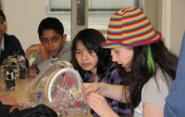Yale Engineering Grad Students Contribute to Science and Engineering Education in Local Middle School

In the window of Ms. Cashman's 7th grade science classroom at the New Haven Engineering and Science University Interdistrict Magnet School (ESUMS) hangs a hydroponic vegetable garden designed and built by third-year Yale Engineering doctoral student Patrick Foley. Foley is part of new student-led program, developed to enrich local science and engineering education by pairing Yale Engineering grad students with ESUMS middle school teachers.
The program, titled "YES" for "Yale Engineers in Schools" is the creation of soon-to-graduate doctoral candidate Sarah Miller, who recently received Yale's distinguished Graduate Ivy Award for her outstanding commitment and contribution to the community of New Haven. In spring 2010, Miller began laying the groundwork and making contacts at ESUMS, a school that only recently opened its doors in the fall of 2008.
Currently enrolled with 6th-8th grade students, ESUMS offers students a broad curriculum, but taught with the unique science and engineering methods of engaging through hands-on discovery, critical thinking, and investigation. "As a young student, I was never exposed to such complex concepts in such an interesting format," says Foley, who spends a half day each week in the classroom.
For Foley, having the opportunity to teach new concepts, see how the students react, and gain feedback from the teachers has provided an invaluable lesson in how to effectively communicate ideas. While most engineering graduate students are well versed in communicating technical findings to their peers, there is little opportunity to learn how to communicate to a lay audience, which is important in all engineering disciplines, but as Foley points out, especially in his field of environmental engineering.
"We're a unique breed of engineers in that when we are looking at solutions to problems, none of them are just technological solutions. All of them require participation of society to resolve conflict between humans and the environment and those solutions are going to come through public awareness and education." Both Foley and second-year doctoral student Leanne Pasquini, who will lead the program forward, agree that it is a natural progression for environmental engineering students to seek public outreach opportunities, which is why it is no surprise that a majority of the volunteers are from this department.
On April 20, ESUMS students had the opportunity to come to Yale Engineering for an event Pasquini organized to engage students in lab demonstrations and a design contest. Fifteen students attended who were also enrolled in Yale Pathways, a program designed to encourage students to pursue college degrees in STEM (science, technology, engineering, and math) fields. "Going to ESUMS each week and the Pathways event keeps me sane," says Pasquini. "It's so rewarding when students are excited to see you and you know you've made that connection."
Pasquini spent nearly two years teaching high school chemistry before entering Yale. Foley is a product of the Connecticut education system and committed to doing what he can to enrich local public education in the sciences. Miller taught 7th grade math and science as part of Teach for America for two years before entering Yale. While set to graduate this May, Miller's career plans are still in the works, although she is certain they will involve some element of education.

